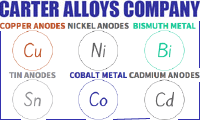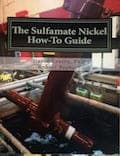
-----
Making Dummy Cathodes for a Plating Bath
Quickstart:
Production plating facilities process a lot of work and often use the same process solution for years, so contaminants build up and must be removed.
When the contaminant metal is more noble than the metal you are plating -- copper contaminating a nickel bath for example -- it will plate out preferentially onto scrap if a low voltage is maintained.
This is called dummy plating. The scrap item is often a corrugated (for more surface area) sheet of steel supplied with hooks to conveniently hang on the cathode rod during non-production hours.
Q: Where can I buy a dummy plate for my tanks? I have only one. It looks like corrugated steel.
James Driscolloperator - West Hartford, Connecticut
February 13, 2025
A. Hi James,
James Watts says on this page that some (unnamed) companies used to sell dummy plates, but I've personally never seen them listed anywhere. Rather, any weld shop anywhere can easily make them for you. Take a pic of what you've got, put the important dimensions on it. Easy 🙂
Luck & Regards,

Ted Mooney, P.E. RET
Striving to live Aloha
finishing.com - Pine Beach, New Jersey
Ted can be retained for immediate
answers or long term project help
Multiple threads merged: please forgive chronology errors and repetition 🙂
Q. I measured the thickness of our cathode plate; its middle calculated value is 1.914 mm. In dummy plating controls, the voltage meter and current meter displays respectively 1.6 dV, 1.5 mA. Who can think, that after two years of utilization of our cathode plate, its thickness evolves normally with this voltage and current value?
Mustapha HADJLAZER DUPLICATION - Oran, Algeria
2002
A. Hi Mustapha,
That thickness doesn't strike me as unusual but I'm not understanding what you are saying. Please make your question three times longer and maybe I'll understand it :-)
But I don't know where 1.5 mA comes into this -- that would be too low for a dummy plate the size of a postage stamp.

Ted Mooney, P.E.
Striving to live Aloha
finishing.com - Pine Beach, New Jersey
Ted can be retained for immediate
answers or long term project help
Dummy Cathodes for nickel sulfamate bath
Q. I am planning to fabricate a Corrugated Dummy to Plate Impurities out of my Nickel Sulphamate Plating Tank. I am looking for suggestions for use of correct material in making this Dummy. Should it be Mild Steel or Stainless Steel or Nickel Alloy ?
Additionally, a sample drawing to define shape of such dummy cathode may also be provided.
Thanks,
Plating Shop Employee - Karachi, Pakistan
January 3, 2008
|
|
A. Dear Muhammad - Warsaw, Poland A. Any of the material you proposed is OK. Mild steel will be the less expensive and if care is taken not to let it dissolve (like too much reverse or inadvertently left in the solution w/o current), it will not harm your bath at all. Stainless is more forgiving but more expensive. Nickel is totally safe but most expensive of all. Corrugations may be bent at 90o to a 1/4" radius or less and 2 to 4 inches deep (peak to valley). It should be LARGE considering your bath size. Remember to inspect the dummy after use to avoid over utilization (waste nickel) and clean it before re-use. Sand blasting is our preferred method but any mechanical method is acceptable provided it leaves its surface clean again. Guillermo MarrufoMonterrey, NL, Mexico |
Multiple threads merged: please forgive chronology errors and repetition 🙂
Q. I have searched for a place to purchase some corrugated dummy plates for our nickel sulfamate bath and was unable to locate anyone. Is it possible for someone to provide some guidance pertaining to the dummy plate parameters, i.e., material to use, size of plate versus tank size, most of our tanks are 350 gallons, and dimensions for the folds in the metal, this is of course if we have to fabricate on in-house? I thank you in advance.
Jack Honore IIIhologram industry - Robbinsville, New Jersey
July 16, 2008
A. There used to be a few places that sold the dummy cathodes.
I used corrugated steel that I stripped the zinc off and used. The problem that it had was it was a one use material as the cathode rusted heavily at the plate-no plate interface.
I took some 0.030 316 SS sheet to a sheet metal shop and had them bend 90 degree bends (sharp) in it. It gives you a very very low density area that you can use as a guide for the amperage that you use. Typical is about 2 amps per square foot. You can use a bit higher, but you waste more nickel. If you are in a rush, use 5 ASF for the first try.
Strip the cathode. You may be able to actually peel the trash plate off if you do not clean or activate the cathode. Put it away dry and periodically use it over night to keep the trash metals to a low level.
- Navarre, Florida
A. Hi Jack,
Usually dummy cathode plates have as large an area as possible. So, make them a little shorter than the cathode rail and about the depth of the anodes. Corrugated as already explained. Before you start dummying, plate the sheets at a higher current density to get a good sound nickel layer. It is very important to have good agitation during dummying to ensure that the contaminants are brought to dummy sheet. Otherwise you will get a nice clean sheet and keep the contaminants. A classic problem is wanting to dummy overnight but not wanting to run the air compressor for safety/noise reasons.
Harry

Harry Parkes
- Birmingham, UK
Multiple threads merged: please forgive chronology errors and repetition 🙂
Do we need to "leach" nickel anode squares and dummy cathodes?
Dear all,
I've a question about cleaning your dummy cathode, and actually your anode(s) as well. So much care is taken cleaning the solution when it is freshly made up. You have to leach the tank and anode bags etc. . . but I can't find any mention in my literature about cleaning your anode and dummy cathode. Surely there must be some organic contamination because of handling? I am tempted to clean my SS dummy with acetone
⇦ on
eBay
or
Amazon
[affil link] Flammable!
followed by a 1:? HCl etch. Same for my nickel anodes (pure nickel squares). Is that alright to do or what would you recommend? Thanks for your reply!

Wesley van de Ven
- Weert, Netherlands
February 27, 2014
A. Hello Wesley,
It's good to hear someone is concerned about the proper way to kick off a new bath. If your company is going to spend good money on a new bath, you want to start off right. I've always used Ni "S Rounds", and they always came in clean from the supplier, so no cleaning was necessary. With the Ni squares, you could put them through a hot acid soak cleaner with a little manual agitation for 5 mi, triple cascade rinse then bag the anodes. When the anodes are bagged, I like to go through a 10% sulfuric dip for 1 minute (for Ni sulphate baths), or a HCl dip for Chloride Strike Baths, rinse in DI water for 30 seconds, then put them in the tank. The cathode dummy panel can be cleaned as you were to clean steel in your plant followed by an HCl dip. I don't think acetone is needed. Good Luck!!!
process engineer - Malone, New York
![]() Thanks Mark for the good advice!
Thanks Mark for the good advice!
cheers,
Wesley

Wesley van de Ven
- Weert, Netherlands
adv.: Supplier of Copper Anodes, Nickel Anodes, Bismuth Metal, & Other Metal Products for Industry & The Arts

Q, A, or Comment on THIS thread -or- Start a NEW Thread
